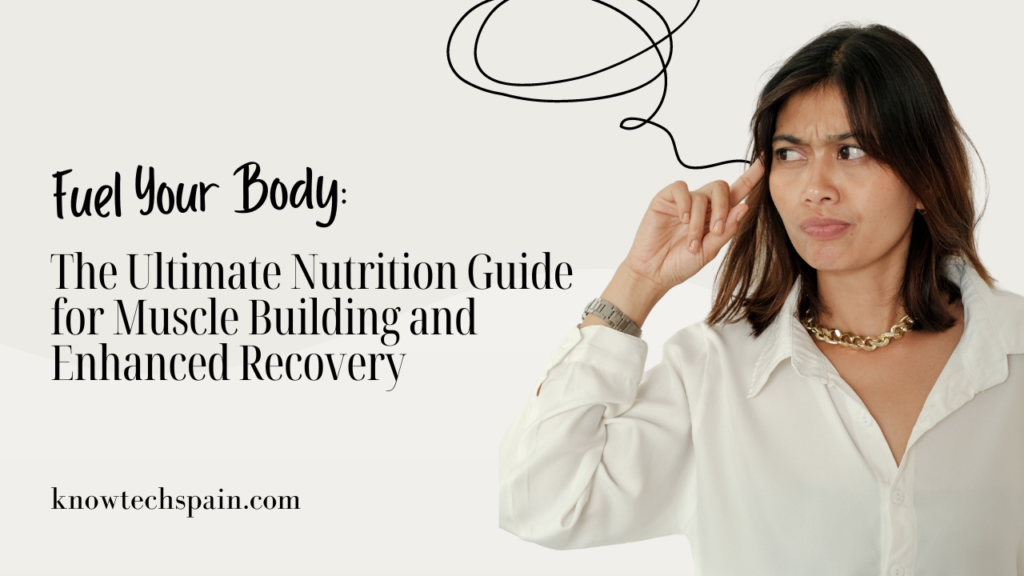Fuel Your Body: The Ultimate Nutrition Guide for Muscle Building and Enhanced Recovery
1. Understanding the Basics of Muscle Building Nutrition
1.1. The role of macronutrients in muscle growth
When it comes to building muscle, macronutrients are your best friends. Proteins, carbohydrates, and fats each play a crucial role in helping you gain that lean muscle mass you’re after.
Proteins are the building blocks of muscle tissue. They help repair and rebuild the tiny tears that occur in your muscles during exercise. Without enough protein, your body can’t effectively build new muscle.
Carbohydrates are your body’s primary source of energy. They fuel your workouts and help you push through those tough training sessions. Plus, they help spare protein, allowing it to focus on muscle building rather than being used for energy.
Fats might seem like the odd one out, but they’re essential for hormone production, including testosterone, which is crucial for muscle growth.
1.2. Importance of micronutrients for overall health
While macros often steal the spotlight, let’s not forget about micronutrients. These vitamins and minerals are the unsung heroes of muscle building and overall health.
Micronutrients support various bodily functions that indirectly impact muscle growth. For instance, vitamin D helps with calcium absorption, which is crucial for bone health – and you need strong bones to support those growing muscles!
Iron is another key player. It helps transport oxygen to your muscles, which is essential for energy production during workouts. And let’s not forget about zinc, which aids in protein synthesis and hormone production.
I remember when I first started my fitness journey, I was so focused on protein shakes and carb-loading that I completely neglected my veggie intake. Big mistake! Once I started incorporating a variety of colorful fruits and vegetables into my diet, I noticed a significant improvement in my energy levels and recovery time.
1.3. Caloric surplus: How much is enough?
To build muscle, you need to eat more calories than your body burns. This is called a caloric surplus. But here’s the tricky part – you want to eat enough to support muscle growth without gaining too much fat.
A good rule of thumb is to aim for a surplus of about 300-500 calories per day. This usually translates to gaining about 0.5-1 pound per week, which is a healthy rate of muscle gain.
However, everyone’s body is different. You might need to adjust this based on your metabolism, activity level, and how your body responds. It’s all about finding that sweet spot where you’re gaining muscle without piling on unnecessary fat.
I’ve found that tracking my food intake and weight for a few weeks helps me figure out the right calorie level. It takes a bit of trial and error, but once you find your personal sweet spot, you’re golden!
2. Protein: The Building Block of Muscles
2.1. Optimal protein intake for muscle gain
Protein is crucial for muscle growth, but how much do you really need? The general recommendation for those looking to build muscle is about 1.6 to 2.2 grams of protein per kilogram of body weight per day.
For example, if you weigh 70 kg (about 154 lbs), you’d aim for about 112 to 154 grams of protein daily. This might seem like a lot, but remember, you’re spreading this out over several meals throughout the day.
It’s important to note that more isn’t always better. Your body can only use so much protein at once for muscle building. Excess protein is either used for energy or stored as fat.
2.2. Best sources of protein for muscle building
Not all proteins are created equal. Animal sources like lean meats, fish, eggs, and dairy products are considered complete proteins, meaning they contain all the essential amino acids your body needs.
Plant-based proteins can be great too, especially when combined to ensure you’re getting all essential amino acids. Some excellent plant protein sources include:
- Legumes (beans, lentils, chickpeas)
- Quinoa
- Tofu and tempeh
- Nuts and seeds
I’m a big fan of mixing it up. For breakfast, I might have eggs with whole grain toast. Lunch could be a chicken salad, and dinner might be a tofu stir-fry with lots of veggies. Variety not only ensures you’re getting a good mix of nutrients but also keeps meals interesting!
2.3. Timing your protein consumption for maximum benefits
While total daily protein intake is most important, timing can also play a role in maximizing muscle growth. Spreading your protein intake evenly throughout the day can help maintain a positive protein balance.
Aim to include a good source of protein with each meal and snack. Many people find it helpful to have a protein-rich snack before bed, as this can support muscle recovery overnight.
Post-workout protein is particularly important. Try to have a protein-rich meal or shake within an hour after your workout to support muscle repair and growth.
Remember, consistency is key. It’s better to maintain a steady protein intake every day rather than alternating between very high and very low protein days.
3. Carbohydrates: Energy for Intense Workouts
3.1. Types of carbohydrates and their impact on muscle growth
Carbohydrates often get a bad rap, but they’re essential for fueling intense workouts and supporting muscle growth. There are two main types of carbs: simple and complex.
Simple carbs, found in foods like fruits, milk, and sugary snacks, are quickly digested and can provide a rapid energy boost. They can be useful right before or after a workout when you need quick fuel.
Complex carbs, found in whole grains, legumes, and vegetables, are digested more slowly. They provide sustained energy and are great for maintaining stable blood sugar levels throughout the day.
Both types can be beneficial for muscle growth when used correctly. Complex carbs should make up the majority of your carb intake, while simple carbs are best reserved for around workout times.
3.2. Carb cycling for muscle building and fat loss
Carb cycling is a strategy where you alternate between high-carb and low-carb days. The idea is to fuel intense workouts with higher carb intake on training days, while potentially burning more fat on rest days with lower carb intake.
A typical carb cycling week might look like this:
- High-carb days: On heavy training days (e.g., leg day)
- Moderate-carb days: On lighter training days
- Low-carb days: On rest days
I’ve tried carb cycling myself and found it can be effective, but it does require careful planning. It’s not necessary for everyone, but some people find it helps them break through plateaus in muscle gain or fat loss.
3.3. Pre and post-workout carbohydrate strategies
Pre-workout carbs can help fuel your training session. Aim for easily digestible carbs about 1-2 hours before your workout. A banana with some peanut butter or a small bowl of oatmeal can work well.
Post-workout, your muscles are primed to absorb nutrients. Having some fast-acting carbs along with protein can help replenish glycogen stores and kick-start recovery. A fruit smoothie with protein powder or a turkey sandwich on whole grain bread are good options.
Remember, these are general guidelines. You might need to experiment to find what works best for your body and schedule.
4. Fats: Essential for Hormonal Balance
4.1. The role of healthy fats in muscle building
Fats play a crucial role in muscle building, even though they might not seem as directly related as protein or carbs. They’re essential for hormone production, including testosterone and growth hormone, which are key players in muscle growth.
Fats also help with the absorption of fat-soluble vitamins (A, D, E, and K), which support overall health and indirectly contribute to muscle growth and recovery.
Plus, fats are a concentrated source of energy. While carbs are the preferred fuel for high-intensity exercise, fats can provide sustained energy for longer, lower-intensity activities.
4.2. Optimal fat intake for muscle growth
The right amount of fat in your diet can support muscle growth without leading to excessive fat gain. Generally, about 20-35% of your total daily calories should come from fats.
For someone eating 3000 calories a day, this would mean about 67-117 grams of fat. This might sound like a lot, but remember that fats are calorie-dense (9 calories per gram compared to 4 for protein and carbs).
It’s not just about the quantity, though. The quality of fats is equally important. Focus on getting most of your fats from healthy sources.
4.3. Best sources of fats for muscle building diets
When it comes to fats for muscle building, focus on these healthy sources:
- Monounsaturated fats: Found in olive oil, avocados, and nuts
- Polyunsaturated fats: Including omega-3s from fatty fish, flaxseeds, and chia seeds
- Saturated fats: In moderation, from sources like coconut oil and grass-fed beef
I like to include a variety of these in my diet. I might have salmon for dinner one night, sprinkle some nuts on my morning oatmeal, and use olive oil for cooking. It’s all about balance and variety!
Try to limit trans fats, which are often found in processed foods and can have negative health effects.
Remember, while fats are important, they’re also high in calories. If you’re having trouble gaining weight, adding some healthy fats can be an easy way to increase your calorie intake. On the flip side, if you’re gaining weight too quickly, this might be an area to cut back slightly.
5. Hydration and Muscle Recovery
5.1. Importance of proper hydration for muscle growth
Water might not be the first thing you think of when it comes to muscle building, but it’s incredibly important. Your muscles are about 79% water, so staying hydrated is crucial for their function and growth.
Proper hydration helps transport nutrients to your muscles, removes waste products, and helps maintain blood volume. This means better performance during workouts and faster recovery afterward.
Dehydration, on the other hand, can lead to decreased strength, reduced endurance, and slower recovery. Even mild dehydration can impact your performance in the gym.
5.2. Electrolyte balance and its impact on recovery
Electrolytes are minerals in your blood and other bodily fluids that carry an electric charge. They play a crucial role in muscle function and hydration.
When you sweat during a workout, you’re not just losing water – you’re losing electrolytes too. The main electrolytes lost in sweat are sodium and chloride, with smaller amounts of potassium, magnesium, and calcium.
Maintaining proper electrolyte balance is important for muscle contraction, nerve signaling, and fluid balance. An imbalance can lead to muscle cramps, fatigue, and poor recovery.
5.3. Hydration strategies for before, during, and after workouts
Staying hydrated isn’t just about drinking water during your workout. It’s a all-day process. Here’s a simple strategy:
Before workout:
- Drink about 500ml of water 2-3 hours before exercise
- Have another 250ml about 15 minutes before you start
During workout:
- Aim for about 250ml every 15-20 minutes, especially during longer or more intense sessions
After workout:
- Drink to thirst, and aim to replace any weight lost during the workout (1kg lost = 1L of fluid to replace)
For most gym sessions, water is sufficient. However, for very long or intense workouts, especially in hot conditions, you might benefit from a sports drink to replace electrolytes.
I always keep a water bottle with me throughout the day. It helps me stay on top of my hydration without having to think too much about it. And trust me, once you get into the habit, you’ll notice a difference in how you feel both in and out of the gym!
6. Supplements for Muscle Building and Recovery
6.1. Essential supplements for muscle growth
While a balanced diet should be your primary focus, certain supplements can support your muscle-building efforts. Here are a few that are backed by research:
- Protein powder: Whey, casein, or plant-based options can help you meet your protein needs.
- Creatine: This can help increase strength and muscle mass when combined with resistance training.
- Beta-alanine: May help improve exercise performance and reduce fatigue.
Remember, supplements are meant to supplement a good diet, not replace it. They’re not magic pills, but they can give you a little extra boost.
6.2. Recovery-enhancing supplements
Recovery is just as important as the workout itself. These supplements may help speed up your recovery:
- BCAAs (Branched-Chain Amino Acids): Can help reduce muscle soreness and fatigue.
- L-glutamine: May help reduce muscle breakdown and support immune function.
- Fish oil: The omega-3s can help reduce inflammation and support joint health.
I’ve found that BCAAs really help me feel less sore after a tough workout. But everyone’s different, so you might need to experiment to see what works best for you.
6.3. Natural alternatives to synthetic supplements
If you prefer to stick to whole foods, there are plenty of natural alternatives that can support muscle growth and recovery:
- Tart cherry juice: Natural anti-inflammatory that may help reduce muscle soreness
- Beet juice: Can improve exercise performance and blood flow
- Greek yogurt: High in protein and probiotics for gut health
- Bananas: Great source of easily digestible carbs and potassium
I’m a big fan of using food as medicine. After a workout, I often have a smoothie with Greek yogurt, banana, and tart cherry juice. It’s tasty and gives me a lot of what I need for recovery.
7. Meal Planning and Timing for Optimal Results
7.1. Creating a balanced meal plan for muscle building
A good muscle-building meal plan should include a balance of proteins, carbs, and fats, along with plenty of fruits and vegetables for micronutrients. Here’s a simple template:
- Breakfast: Oatmeal with fruit and nuts, plus eggs or Greek yogurt
- Snack: Apple with peanut butter
- Lunch: Chicken or tofu stir-fry with brown rice and vegetables
- Post-workout: Protein shake with banana
- Dinner: Salmon or lean beef with sweet potato and broccoli
- Before bed: Cottage cheese or casein protein shake
Remember to adjust portion sizes based on your individual calorie needs. And don’t forget to include a variety of foods to ensure you’re getting a wide range of nutrients.
7.2. The importance of meal timing for muscle growth
While total daily intake is most important, meal timing can help optimize muscle growth. Here are some key points to consider:
- Eat every 3-4 hours to maintain a steady supply of nutrients
- Have a meal containing both protein and carbs within an hour after your workout
- Consider having a slow-digesting protein source before bed to support overnight recovery
That said, don’t stress too much about perfect timing. Consistency in your overall diet is more important than perfect meal timing.
7.3. Strategies for maintaining a consistent eating schedule
Keeping a consistent eating schedule can be challenging, especially with a busy lifestyle. Here are some strategies that have helped me:
- Meal prep: Spend some time on the weekend preparing meals for the week
- Keep healthy snacks handy: This helps avoid skipping meals or making unhealthy choices
- Use a food tracking app: This can help you stay accountable and ensure you’re meeting your nutritional goals
- Set reminders: If you tend to forget meals, set alarms on your phone
Remember, it might take some time to find a routine that works for you. Be patient with yourself and make adjustments as needed.
Summary
Building muscle and enhancing recovery is a journey that involves more than just lifting weights. It requires a comprehensive approach to nutrition, focusing on:
- Balancing macronutrients and ensuring adequate micronutrient intake
- Consuming enough protein from quality sources
- Using carbohydrates strategically to fuel workouts and recovery
- Including healthy fats for hormonal balance
- Staying properly hydrated
- Considering supplements if needed
- Planning and timing meals for optimal results
Remember, everyone’s body is different. What works for one person might not work for another. Don’t be afraid to experiment and find what works best for you. And most importantly, be patient and consistent. Building muscle takes time, but with the right nutrition and training, you’ll get there!
FAQs
- How much protein do I really need to build muscle?
Generally, aim for 1.6 to 2.2 grams of protein per kilogram of body weight daily. However, individual needs may vary based on factors like age, gender, and activity level.
- Can I build muscle on a vegetarian or vegan diet?
Absolutely! While it might require more planning, you can definitely build muscle on a plant-based diet. Focus on combining different plant protein sources to ensure you’re getting all essential amino acids.
- How important is post-workout nutrition?
Post-workout nutrition is important, but it’s not the be-all and end-all. While having a meal with protein and carbs within an hour after your workout can help kick-start recovery, your total daily nutrition is more crucial for long-term results.
- Should I avoid carbs to build muscle and lose fat?
No, carbs are important for fueling your workouts and supporting recovery. Instead of avoiding car


